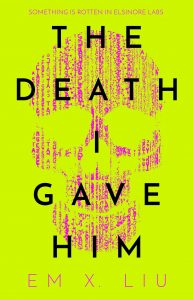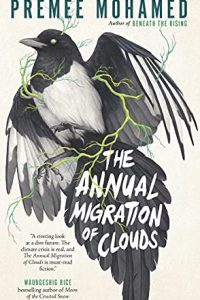Alexandra Pierce Reviews The Death I Gave Him by Em X. Liu
 The Death I Gave Him, Em X. Liu (Solaris 978-1-78618-998-1, $26.99, 351, hc) September 2023. Cover by James Macey.
The Death I Gave Him, Em X. Liu (Solaris 978-1-78618-998-1, $26.99, 351, hc) September 2023. Cover by James Macey.
With a tagline like ‘‘Something is rotten in Elsinore Labs,’’ a reader with a background knowledge of Shakespeare knows exactly what they’re getting with The Death I Gave Him by Em X. Liu: Hamlet, but make it science.
The book’s foreword explains that the following events all occurred over just one day in 2047. What we are reading is a retelling of those events that has been compiled by a history student some time later, using a variety of sources including court documents, reconstructed camera footage, and a memoir.
The central character is Hayden Lichfield, who is working with his scientist father Graham to create an immortality serum; they have already developed a neuromapper, enabling a link between human and computer. Graham’s brother, Charles, also works in Elsinore Labs; the head of security is Paul Xia, whose daughter Felicia Xia once dated Hayden. The narrative proper opens with the operating system for Elsinore Labs – named Horatio – coming back online after an unexpected shutdown, his cameras revealing two people in the main laboratory: Hayden Lichfield and the dead body of his father, Dr. Graham Lichfield.
Liu, in their second book published this year (after If Found Return to Hell), makes some significant changes to Shakespeare’s original story, beyond the modernized context. It’s noted from the outside that Felicia has written a memoir about her experiences, flagging right up front that she doesn’t die. Indeed, aside from the context, the most significant alteration that Liu makes is giving Horatio and Felicia (Ophelia) interiority. They are allowed to speak for themselves, have motivations, and generally exist as actual characters, rather than be the sounding-boards Shakespeare used them for. This is one of the great strengths of the novel. The narrative isn’t reliant on Hayden for things to actually happen, which is good because he is as dithering as Hamlet famously is; here, the best friend and the ex-girlfriend are active participants in events, which make it a much more rounded and engaging story than it might otherwise be.
Liu does follow the basic outline of the Hamlet story: With a newly dead father, the son wants to find out who killed him; a lot of soul-searching ensues, and more (accidental) deaths. Happening over just a few hours, it’s a streamlined version of the narrative – there are no plays-within-a-play, no extended fighting scenes. Thematically, Liu picks up on some of the significant ideas from Shakespeare’s play, and develops them really nicely. In particular, because of Graham’s murder, Elsinore Labs are in lockdown: Hayden, and everyone else, are physically trapped in a literal manifestation of Hayden/Hamlet’s state of mind. As well, the entire narrative is obsessed with questions of mortality; the quest to somehow circumvent death was Lichfield senior’s aim for years, and Hayden has joined him in that; it’s this research that Charles wants, rather than the kingdom of the original play. Hayden is also personally fixated on death and a fear of dying; one of his tics is holding his own wrist – searching for his pulse – seeking assurance of his own existence.
One aspect that doesn’t entirely work is the character of Horatio. Making him a near-omniscient AI is a great choice by Liu, making it possible for Horatio to frequently interact with Hayden, and (via their neuromapper link) to understand him in a way that Hamlet never gets; Hayden is a lot less alone than Hamlet, and that’s a positive. Liu leans into a queer reading of Hamlet and Horatio’s relationship, which also works in theory. However, while I am in favor of exploring the notion of an AI having feelings for a human and wanting to demonstrate that, I was frustrated by a lack of explanation for how Horatio comes to this feeling. It suddenly appears in the story, with little development, and I was left puzzled – like I had missed a conversation, or an introspective moment from Horatio. It meant that I didn’t entirely buy their relationship and its consequences.
Despite how much I’ve compared the two, you don’t need to have read, studied, or watched Hamlet to enjoy this novel. Indeed, without all of that Shakespeare background, a reader gets to experience the story without constantly thinking about parallels and divergence; they get to simply experience a story of science, ambition, AI, and betrayal. And that’s a fine thing.
*It should be noted that there is discussion of self-harm in this book. One instance is flagged within the narrative, but there are a couple of other moments that are not; readers for whom this is a red flag should be aware.
Alexandra Pierce reads, writes, podcasts, cooks and knits; she’s Australian and a feminist. She was a host of the Hugo Award winning podcast Galactic Suburbia for a decade; her new podcast is all about indie bookshops and is called Paper Defiance. Alex has edited two award-winning non-fiction anthologies, Letters to Tiptree and Luminscent Threads: Connections to Octavia E Butler. She reviews a wide range of books at www.randomalex.net.
This review and more like it in the December and January 2023 issue of Locus.
 While you are here, please take a moment to support Locus with a one-time or recurring donation. We rely on reader donations to keep the magazine and site going, and would like to keep the site paywall free, but WE NEED YOUR FINANCIAL SUPPORT to continue quality coverage of the science fiction and fantasy field.
While you are here, please take a moment to support Locus with a one-time or recurring donation. We rely on reader donations to keep the magazine and site going, and would like to keep the site paywall free, but WE NEED YOUR FINANCIAL SUPPORT to continue quality coverage of the science fiction and fantasy field.
©Locus Magazine. Copyrighted material may not be republished without permission of LSFF.






